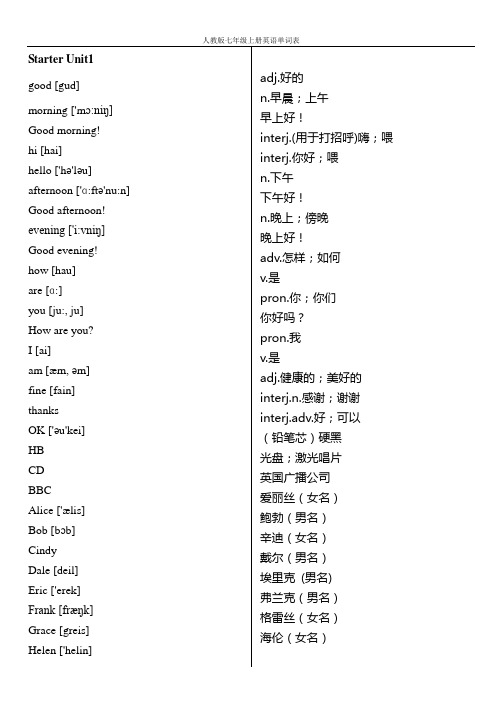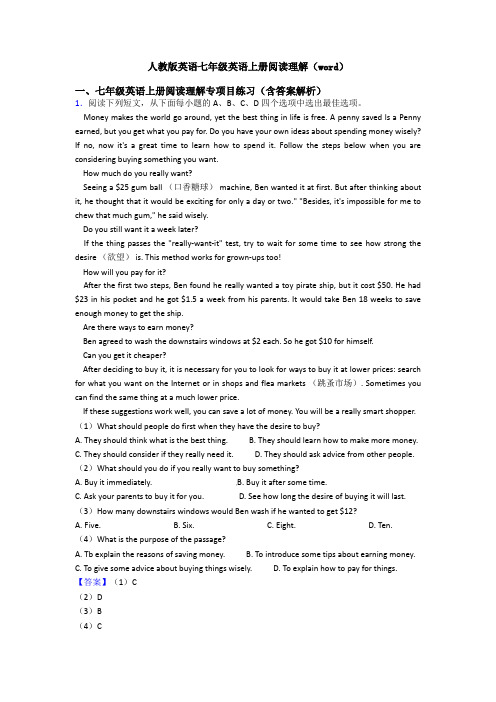(word完整版)英语七年级上册人教版
(word完整版)人教版七年级英语上册练习题

人教版七年级英语上册练习题Ⅰ.字母书写A)默写字母 A 至 H 的大小写形式 B) 按字母次序写出以下字母1. F D E . b ac. H F G E. d cbe. F GD EC Ⅱ.词汇A)依据提示选择正确的缩略词1.电视机 A. CD2.硬黑笔 B. BC3.英国广播电台 C. TV4.唱片 D. BBC5.公元前 E. HBB)依据句意和首字母提示达成单词6.— Good e______, Dale!—Good evening, Alice!7.— H______, Grace!—Hello, Frank.8.— H______ are you?—I?m fine, thanks.9.My n______ is Helen.10.— G______ afternoon, Mr Zhao.—Good afternoon, Bob!Ⅲ.单项选择1.英语中共有 ______个字母,此中 ______个是元音字母,其他 ______个是辅音字母。
A.6,1,B.6,,1C.8,1,D.8,,12.字母 Cc 和 Ff 是______。
A.元音B. 辅音C. 元音字母D. 辅音字母3.以下字母按其在字母表中的次序摆列,错误的选项是______。
4.以下字母与字母 C 含有同样音素的是 ______。
5.以下选项与字母 F 含有同样音素的是 ______。
A.a B. Helen C. d D. b6.大写字母 A、E、 F、 H 的笔画都是 ______笔。
7.字母 Aa 和字母 ______含有同样的读音。
8.表示铅笔笔芯“硬黑”的字母是“ ______”。
9.“Bob” is a ______.A. girlB. boyC. penD. CD10.与单词 sea 同音的字母是 ______。
A. BbB. CcC. DdD. Ee11.清晨,熟人相见能够说“ ______”A.Good morning.B. Good afternoon.C.Good evening.D. Goodbye.12.下午,遇到别人能够说“ ______”。
(word完整版)2017人教版七年级上册英语单词表

What about...?
yours [jɔ:z]
for [fɔ:, fə]
thank you for...
help [help]
welcome ['welkəm]
You're welcome
baseball ['beisbɔ:l]
watch [wɔtʃ]
computer [kəm'pju:tə]
mother ['mʌðə]
father ['fɑ:ðə]
parent ['pɛərənt]
brother ['brʌðə]
grandmother ['grænd'mʌðə]
grandfather ['grænd'fɑ:ðə]
grandparent ['grændperənt]
family ['fæmili]
adv.这些
pron.他(她、它)们
interj.嗯;好吧
v.经受;经历
n.一天;一日;白天
(表示祝愿)过得愉快!
再见
n.儿子
n.堂兄(弟、姐、妹);表兄(弟、姐、妹)
n.(口语)(外)祖父;爷爷;外公;姥爷
n.(=mum)妈妈
n.姑母;姨母;伯母;婶母;舅母
n.(口语)(外)祖母;奶奶;外婆;姥姥
your [jɔ:]
Ms.
his [his]
and [ænd, ənd]
her [hə:, hə]
yes [jes]
she [ʃi:, ʃi]
he [hi:]
no [nəu]
not [nɔt]
(word完整版)人教版英语七年级上册所有单元知识点总结(2),推荐文档

七年级各单元知识点汇总Unitl My name 'Gina.重点短语1. your/his/her/my name 你的/他的/她的/我的名词2. first name 名字3. middle school 中学4. teleph one nu mber 电话号码5. last name 姓6. in Chi na 在中国重点句型1. —What 'your name?你叫什么名字?—Alan艾伦2. —I'm Jenny. Nice to meet you.我是珍妮。
见到你很高兴。
—Nice to meet you, too.见到你我也很高兴。
3. —Good morni ng! I 'm Ci ndy.早上好!我是辛迪。
—Hello, Ci ndy! I'm Dale .你好,辛迪!我是戴尔。
4. —My name 'Linda. Are you Helen?我是琳达。
你是海伦吗?5. —What 'her name?她叫什么名字?—She'Ja ne.她是简。
6. —Is he Jack?他是杰克吗?—No, he isn ' t. His namMke'.不,他不是。
他的名字是迈克。
7. What 'your phone number?你的电话号码是多少?It'587-6275.它是587-6275。
8. My friend is in China.我的朋友在中国。
重点语法2. Be动词的一般现在时形式:am, is, areI 用am You 用areIs用于他他它Unit2 This is my sister.重点短语1. family n ame 全家福2. have a good day (表示祝愿)过得愉快!3. a picture of 一张.... 的照片4. in the first phone 在第一张照片里5. family tree家庭关系图6. the name of ................... 的名字重点句型1. That 'my family. Those are my pare nts.那是我的家人,那是我的妹妹。
人教版英语七年级上册单词表Word文档

序 号
单词
词性
词义
Starter
1.
good
adj.
好的;令人满意的
2.
morni ng
n.
早晨;上午
3.
good morning
早上好!
4.
hi
int.;
嗨
5.
hello
int.
喂
6.
HB=heavy barrel;
abbr.
(铅笔芯)硬黑
7.
CD
n.
光盘
8.
BBC
英国广播公司
n.
字典;词典
119.
that
pron.
那;那个
120.
yes
adv
(表示冃疋)是
121.
no
adv
(表示否定)不;不是
122.
not
ad.
(构成否定形式)不是
123.
sn 't=is not
不是
124.
excuse
v.
原谅;宽恕
125.
Excuse me.
请原谅
126.
tha nk[-s]
int.
79.
an swer
n.
回答
80.
ook
v.
看;望;看起来
81.
first
adj
第一的
82.
first n ame
名字
83.
ast
a.
取后的;上一个的
84.
ast n ame
姓氏
85.
boy
n.
男孩
86.
girl
人教版英语七年级英语上册阅读理解(word)

人教版英语七年级英语上册阅读理解(word)一、七年级英语上册阅读理解专项目练习(含答案解析)1.阅读下列短文,从下面每小题的A、B、C、D四个选项中选出最佳选项。
Money makes the world go around, yet the best thing in life is free. A penny saved ls a Penny earned, but you get what you pay for. Do you have your own ideas about spending money wisely? If no, now it's a great time to learn how to spend it. Follow the steps below when you are considering buying something you want.How much do you really want?Seeing a $25 gum ball (口香糖球) machine, Ben wanted it at first. But after thinking about it, he thought that it would be exciting for only a day or two." "Besides, it's impossible for me to chew that much gum," he said wisely.Do you still want it a week later?If the thing passes the "really-want-it" test, try to wait for some time to see how strong the desire (欲望) is. This method works for grown-ups too!How will you pay for it?After the first two steps, Ben found he really wanted a toy pirate ship, but it cost $50. He had $23 in his pocket and he got $1.5 a week from his parents. It would take Ben 18 weeks to save enough money to get the ship.Are there ways to earn money?Ben agreed to wash the downstairs windows at $2 each. So he got $10 for himself.Can you get it cheaper?After deciding to buy it, it is necessary for you to look for ways to buy it at lower prices: search for what you want on the Internet or in shops and flea markets (跳蚤市场). Sometimes you can find the same thing at a much lower price.If these suggestions work well, you can save a lot of money. You will be a really smart shopper.(1)What should people do first when they have the desire to buy?A. They should think what is the best thing.B. They should learn how to make more money.C. They should consider if they really need it.D. They should ask advice from other people.(2)What should you do if you really want to buy something?A. Buy it immediately.B. Buy it after some time.C. Ask your parents to buy it for you.D. See how long the desire of buying it will last.(3)How many downstairs windows would Ben wash if he wanted to get $12?A. Five.B. Six.C. Eight.D. Ten.(4)What is the purpose of the passage?A. Tb explain the reasons of saving money.B. To introduce some tips about earning money.C. To give some advice about buying things wisely.D. To explain how to pay for things.【答案】(1)C(2)D(3)B(4)C【解析】【分析】主要讲了怎样成为一个理智的消费者。
(完整版)新人教版英语七年级上册教材(word版)

Unit 1 My name’s Gina.Language Goals: Introduce yourself;Greet people;Ask for and give telephone number语言目标:介绍自己;问候他人;询问和告知电话号码1aWrite English words for thethings in the picture.写出图中物品的英文名称。
_____map________1b Listen and number the conversations[1-3].听录音,为对话编号。
□A: What’s your name? □A: Good morning! □A: Hi. My name’s Gina.B: Alan. B: I’m Cindy. B: I’m Jenny. Nice to meet you!A: Hello, Alan. I’m Ms Brown. B: Hello, Cindy. I’m Dale. A: Nice to meet you, too.A: Nice to meet you!1c Practice the conversations above with your partner. Then greet your classmates.练习上面的对话,然后问候你的同学。
2a Listen to the conversations and number the pictures [1—4].听对话,为图片编号。
2b Listen again. Circle the names you hear.再听一遍录音,圈出你听到的名字。
Eric Tom Alice Bob Mike Jack Mary Ms. Miller2c Practice the conversations in pairs.两人一组练习下面的对话。
A: Hello! What’s your name A:What’s his name?B: My name’s… B:His name is…A: I’m…A: And what’s her name?B: Nice to meet you! B: Her name is…2d Role play the conversation. 分角色表演对话Linda: Good afternoon! My name’s Linda.Are you Helen?Helen: Yes, I am. Nice to meet you, Linda.Linda: Nice to meet you, too. What’s hername?Helen: She’s Jane.Linda: Is he Jack?Helen: No, he isn’t.His name’s Mike.What’s your name?Alan. /I’m Alan./My name’s Alan.What’s his name?He’s Eric./ His name’s Eric.What’s her name?She’s Mary. / Her name’s Mary.Is he Jack? Yes, he is. / No, he isn’t. His name’s Mike.Are you Helen? Yes, I am. / No, I’m not. I’m Gina.what’s = what is name’s = name is I’m = I amhe’s = he is she’s = she is3a Put the words in order to make conversations. Then practice them.调整词序,组成对话并练习。
(完整word版)新人教版七年级英语上册基础知识练习

人教版七年级上学期词汇-- 专项练习I.依据句意和首字母填单词,使句意圆满。
1.Please have a l_______ at this shop.2.We have shirts in all c_______ at$20 each.3.The red shorts on s_______ are very cheap.4.When is your b_______,Nick? It's June 15th.5.Our English speech t_________is on May 3rd.6.My f_________fruit is banana.7.T________for your help.8.S_______ is the last day of a week.9.Are you f_______ this afternoon?10.His favorite s__________is P.E..11.I have eight classes on W_________.12.J________1st is New Year's Day.13.How do you s_______ pen?14.We want a lot of v_______and fruit.15.The teacher has a q________to ask us.16. “ What's your f________ name?”“ Mike. ”17.We like ice cream for d_________.18.Jack plays sports every day,so he is very h________.19.We are b________with work,so I have no time to play.20.Thank you.You're w________.21.I'm very s______I'm late.22.Playing baseball is not very easy.It's d______.23.A_______ comes after July.24.The hat is not big.It's s_________.II.单词拼写 ,每空一词。
(完整word版)人教版七年级英语上册unit7教学设计

人教版七年级英语上册unit 7 教学设计一、教材分析(一)教材的地位及作用1、新目标英语教材概述《新目标英语》教材的语言教育理念是:知识用于行动强调“语言应用”,培养“创新、实践能力”,发展“学习策略”。
它采用任务型语言教学(Task-based Language Teaching)模式。
教材中每单元都设计一个或几个与该单元话题有关的任务,让学生在完成任务的过程中,使用英语获取信息,用英语进行交流,培养运用英语解决实际问题的能力。
2、单元分析及教材处理本课是新目标英语七年级下册第2单元,教材以I’m more outgoing than my sister. 为中心话题,围绕着描述“人物的特性”展开,学习和运用形容词的比较级,让学生能表述个人的特征,能用比较级对人进行对比描述。
本课教学内容与学生的实际生活密切相关,易于引发学生运用简单的英语进行交际和交流。
在学习活动中,学生通过对周围人物的描述及看法,促进学生之间和师生之间的情感交流,增进情谊。
(二)教学目标根据《英语课程标准》关于总目标的具体描述,结合第七单元的教材内容,我按语言知识、语言技能、学习策略、情感态度、文化意识五个方面将本单元的教学目标细化:语言知识目标1.掌握本课的词汇(主要是:描述人物的词汇)描述外貌:tall short heavy thin long hair short hair描述性格:quiet outgoing calm wild serious funny其它(身体/头脑/年龄/勤奋等):athletic weak smart foolishyoung old hard-working lazy2、掌握语法1)形容词的比较级的构成2)学会用比较级来进行比较语言技能目标能表述个人的特征,能用比较级对人进行对比描述。
(三)教学重点及难点重点难点1.复习词汇tall short heavy thin long hair short hair quiet outgoing calm wild serious funny athletic weak smart foolish young old hard-working lazy等2.句型: Which is bigger, the apple or the orange? Yao Ming is taller than Liu Xiang. Yao Ming ismuch taller than Pan Changjiang.3.形容词比较级的构成及形容词比较级的用法二、学情分析1.初中学生的抽象思维能力较低,形象思维能力强,但注意力容易分散。
- 1、下载文档前请自行甄别文档内容的完整性,平台不提供额外的编辑、内容补充、找答案等附加服务。
- 2、"仅部分预览"的文档,不可在线预览部分如存在完整性等问题,可反馈申请退款(可完整预览的文档不适用该条件!)。
- 3、如文档侵犯您的权益,请联系客服反馈,我们会尽快为您处理(人工客服工作时间:9:00-18:30)。
一、48个国际音标及26个英文字母的正确书写要熟练掌握元音和辅音,5个元音字母(a, e, i, o, u),字母的正确占格及单词间距。
二、be动词的用法be动词有三种变形,分别是:am, is, are。
记忆口诀:“我”用am, “你”用are, is用于“他、她、它”;单数全都用is,复数全部都用are。
三、人称及人称代词的不同形式(主格和宾格)1、三种人称:第一人称(I, we),第二人称(you, you),第三人称(he, she, it, Maria)。
2、人称代词的主格,即人称代词位于句子主语位置时的形态:I, We, You, You, He, She, It, Maria。
3、人称代词的宾格,即人称代词位于句子宾语位置时的形态:me, us, you, you, him, her, it。
4、形容词性物主代词:my, our, your, your, his, her, its, their。
5、名词性物主代词:mine, ours, yours, yours, his, hers, its, theirs。
6、反身代词:myself, ourselves, yourself, yourselves, himself, herself, itself, themselves。
四、基数词(表示数量多少的词,大致相当于代数里的自然数)zero, one, two, three, four, five, six, seven, eight, nine, ten, eleven, twelve, thirteen, fourteen, fifteen, sixteen, seventeen, eighteen, nineteen, twenty, twenty-one, twenty-two, twenty-three,twenty-four, twenty-five, twenty-six, twenty-seven, twenty-eight, twenty-nine, thirty, forty, fifty, sixty,seventy, eighty, ninety, one hundred,one hundred and one。
五、一般疑问句及特殊疑问句1、一般疑问句:一般疑问词,助动词引导eg:do etc。
能用Yes或No来回答的问句。
一般疑问句句尾读升调。
2、特殊疑问句:特殊疑问词引导eg:why etc。
不能用Yes或No来回答的问句。
特殊疑问句句尾读降调。
六、可数名词变复数可数名词变复数时,有规则变化和不规则变化两种。
1、规则变化:1)一般情况直接在词尾加“-s ”,如:cake-cakes, bag-bags, day-days, face-faces, orange-oranges等;2)以s, x, sh, ch结尾的词,要在词尾加“-es ”,如:bus-buses, watch-watches, box-boxes等;3)以辅音字母加y结尾的词,变y为i再加“-es ”,如:baby-babies, country-countries, family-families等;4)部分以f (e)结尾的词,变f (e)为“ves ”,如:knife-knives, half-halves等;5)以o结尾的词,加“-s ”或“-es ”,如:zoo-zoos, photo-photos, tomato-tomatoes, potato-potatoes等。
记忆口诀:除了“英雄”hero-heroes外,凡是能吃的,加“-es ”,不能吃的加“-s ”。
2、不规则变化:1)改变单数名词中的元音字母:man-men, woman-women, foot-feet, tooth-teeth 等;2)单、复同形:sheep-sheep, Chinese-Chinese, Japanese-Japanese等;3)其他形式:mouse-mice, child-children等。
七、简单句的成分及主谓一致原则最基本构成:主语+谓语+宾语,其中谓语由动词来充当。
主谓一致原则,就是句子的谓语要始终与主语保持数量上的一致性。
当主语是第三人称单数(简称“三单”)时,谓语动词也要相应变成单数形式;当主语非“三单”时,谓语动词就用原形。
实意动词变“三单”的规则如下:1)一般动词在词尾加“-s ”,如:like-likes, tell-tells, play-plays等;2)以字母s, x,ch, sh结尾的动词加“-es ”,如:guess-guesses, teach-teaches, watch-watches等;3)以o结尾的动词一般加“-es ”,如:do-does, go-goes等;4)以辅音字母加y结尾的动词,先变y为i,再加“-es”如:fly-flies, carry-carries等;5)have的三单形式是has。
八、冠词的用法(名词前面必须要有冠词)冠词分为定冠词(the)和不定冠词(a, an)两种。
1、定冠词the表示“特指”,可译为“这个”、“那个”、“这些”、“那些”。
2、不定冠词a, an用来表明(可数)名词的数量是“一个”。
an用于以元音开头(注意不是以元音字母开头)的单词前,a则英语非元音开头的单词前。
3、不定冠词a, an与基数词one的区别是:不定冠词不是刻意强调“数量”,而基数词则强调“数量”。
九、助动词(do, does )的用法只有实意动词作谓语时才涉及使用助动词。
以like为例:1)当句子为肯定句时不涉及使用助动词,只涉及“主谓一致”原则。
eg : I like English a lot.Michael likes Chinese food very much.2)当句子为否定句时,要根据主语的人称来决定使用相应的助动词:当主语为“三单”时,要使用does;当主语为“非三单”时,用助动词原形do。
例如把下列句子变否定句:Kangkang likes math.----Kangkang doesn't like math.They like sports.------They don't like sports.3)当句子变疑问句时,同样要根据句子的主语来决定在句首使用Do或Does.例如下列句子变问句:Michael likes Chinese Food.----Does Michael like Chinese food? Yes, he does./ No, he doesn't.Jane and Helen like music.----Do Jand and Helen like music? Yes, they do./ No, they don't.十、名词所有格1、Kangkang's books;Tom and Helen's desk; Ann's and Maria's bikes;2、用of表示“......的”,但要从of后往of前翻译:a book of mine(我的一本书)3、have与of的区别:have一般表示“主动拥有”,往往用于有生命的人或动物;无生命的物体一般不能“主动拥有”,表示所属关系时要用of。
例如:I have a new bike. She has two big eyes.a door of the house十一、课本中的知识点1、Unit 1 ——Unit 21)问候语:Good morning/ afternoon/ evening.How are you?---Just OK, thank you. How are you?---Not bad, thanks.Hi! Hello!How do you do?2)道别用语:Nice/ Glad to meet/ see you.(meet用于初次见面,see用于熟人间)Nice to meet/ see you, too.Goodbye. Byebye. Bye. See you (later/ tomorrow/ next time)! So long! Good night!3)介绍人或者物的句型:This is...4)Excuse me.与I'm sorry.的区别:Excuse me.是要引起对方的注意,而I'm sorry.则是向对方道歉。
5)词组be from = come fromin English5)当问句中问到this/ that时,回答要用it;问到these/ those时,要用they来回答。
例如:What's this in English?----It's an eraser.What are those?----They are books.6)对Thanks.的回答:That's OK./ You're welcome./ My pleasur.7)look the same = have the same looksgive sth. to sb. = give sb. sth.be like = look likein the tree/ on the tree (树上结的、长出来的用on,否则用in)in red(穿着红色的衣服)in the desk(在空间范围之内)in English(用英语)help sb. do sth.(8)both与all的区别:both表示"两者都......";all表示"三者及以上都......"。
2、Unit 3--Unit 4(1)speak的用法speak与say不同:speak表示"说"的动作,不表示"说"的内容;say则表示"说"的内容。
speak后面除了能接"语言"外,不能直接接东西,后面加了to则表示"对......说"。
help sb. with sth.(帮助某人做/补习......)want to do sth.(想要做某事)would like to do sth. not...at all(一点都不);Not at all.(没关系/别介意) like...a lot = like...very much(2)some和any的区别:口诀:some用于肯定句,否定、疑问变any。
例如:I have some money.I don't have any money.Do you have any money?(3)have a seat = take a seat(请随便坐)(4)祈使句(表示命令或请求的句子)祈使句一般都省略了主语You,所以其否定句直接用Don't开头。
